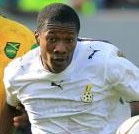At the Cup of Nations two years ago, as Junior Agogo enjoyed unlikely double acclaim as sex symbol and international striker, Asamoah Gyan endured the darker side of the Ghanaian public's mood. Derided after a series of missed chances, he walked out on the squad, vowing he could never play for his country again, and was only persuaded back by sympathetic team-mates. Seeing how demoralised he was, how his confidence had sunk to the level that the abuse had become self-fulfilling, it seemed possible that he would struggle to play any kind of football again.
His redemption since has been remarkable, speaking of great mental fortitude, and this afternoon he represents the main threat to Egypt's hopes of lifting a third successive Africa Cup of Nations title. Gyan has blossomed since a move from Udinese to Rennes and has been central to the progress of Milovan Rajevac's side. He has scored two of their four goals but, more than that, he has proved himself the model of the modern leader of a line.
"I always thought Ghana would do well if he played well," said Abedi Pele, arguably Ghana's greatest ever player. "He is very good and you can play him alone up front. He's composed and fast, good at dribbles, good in the air. He has all that. But in the 2008 Cup of Nations, he was unlucky, and he missed all the chances that he had, and so he couldn't play. The fans got on his back and then he was injured."
Gyan may be ungainly, but it is his ability to hold the ball up and his ceaseless movement that occupies opposition defences and allows Ghana to field as many as four creators in midfield – a rarity in west Africa where, since the days of Pele and Nigeria's Jay-Jay Okocha, the game has become increasingly direct and based on power.
His goal against Angola in the quarter-finals was typical, as he drifted behind the centre-back Francisco Zuela, opening the angle for Kwadwo Asamoah – at 21 perhaps the most promising midfield creator on the continent – to loft a long, diagonal ball into his path. Gathering it, Gyan held off Kali, Angola's libero, and with great awareness and technique, clipped a precise low finish past Carlos Fernandes. His goal against Nigeria, bulleted in from a near-post corner, was rather more prosaic, but underlined what a threat he poses at set-pieces, a vital part of Ghana's armoury given their largely defensive strategy.
Given he scored the fastest goal in the 2006 World Cup, when he reportedly drew admiring glances from Manchester United and Arsenal, it is easy to forget that Gyan is still only 24. It's hard to know whether he is more surprised by his own change of fortune or by the progress of an inexperienced Ghana side who, missing a host of established players through injury, including Michael Essien, have been able to play without the pressure of expectation. "It's unbelievable," he said. "We're a young team and nobody gave us a chance of reaching the final."













